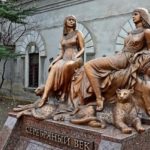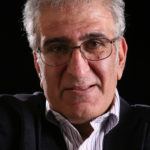THE TWO OF US
1
There are rhymes in this world:
Uncouple them — and it falls apart.
Homer, you were blind as a bat.
Night — over your craggy head.
Night — your rhapsodic cloak,
Night — over your eyes — a curtain.
Would any sighted person separate
Helen from Achilles?
Helen. Achilles.
Name a more consonant sound.
Yes, against chaos
The world is built
On consonances, that, if uncoupled,
Take revenge (built on consent!)
Upon the infidelity of women
Take revenge — by burning Troy!
Rhapsodist, you were blind as a bat:
Scattered treasure, as if it were junk.
There are rhymes — in that world
That were chosen. That will collapse
This one — if you uncouple them. What needs
Holding in rhyme? Helen, growing older!
. . . Achaea’s finest man!
The sweetest woman of Sparta!
Alone in the rustle of a myrtle
Forest, in a cithara’s dream:
“Helen. Achilles:
A broken pair.”
30 June 1924
2
It’s no given, that strong with strong
Come to be joined in this world.
Here’s how Siegfried and Brunhilda missed each other,
And settled the matter of their marriage with a sword.
United in mutual hatred
— Like buffaloes! — rock face — to rock face.
He rose from the marriage bed, unrecognized,
And unidentified — she slept.
Apart — even in the marriage bed —
Apart — even balled into a fist —
Apart — even in the language of double-entendre —
Late and apart — that’s our marriage!
There’s an older instance:
The Amazon taken down like a lion —
Here’s how they missed each other: the son of Thetis
And a daughter of Ares: Achilles
And Penthesilea.
O remember — how from below
She gazed up! an unhorsed rider’s
Gaze! not from Olympus, — out the muck
She gazed up — imperious nevertheless!
And, because of that, afterwards, his one
Desire was: to take her to wife out of darkness.
It’s no given, that equal — will meet with equal . . .
. . . . . . . . . . . . . . . . . . . . . . . . . . . . . . . . . . . . . . .
Here’s how we — come to miss each other.
3 July 1924
3
In a world, where everyone
Is stunted and in a lather,
I know — one
Equal to me.
In a world, where we
Want for so much,
I know — one
Strong as me.
In a world, where everything —
Is ivy and mold,
I know: one
You — equal in essence
To me.
3 July 1924
AN ISLAND
There’s an island. Wrested from the Nereids
By an underground heave.
Virgin ground. Which no one
Has yet mapped or opened up.
Fringed with ferns and hidden
In sea-foam. — The way? Some passage?
I just know: it’s still unclaimed
Anywhere, except in your
Columbian eyes. Two palms:
Clarity! — That vanishes. — At the stroke
Of a condor . . .
(In the sleeping-car
— That’s enough — about islands!)
An hour’s, maybe — a week’s
Sailing (if I can manage it — a year!)
I just know: it’s still unclaimed
Anywhere, except in the latitudes
Of the future . . .
5 July 1924
UNDER A SHAWL
Sealed, like the mouth of an oracle —
Your mouth, augers for many.
Woman, what have you concealed from the guards
Between your tongue and the roof of your mouth?
Looking into the ages, not with your eyes
But with their sockets, like brimming cauldrons!
Woman, what sort of pit have you dug
And roofed over with turf?
No idol with even a hundred heathen
Temples — could be more imperious.
Woman, what have you pulled out of the fire
Of languor and one-night stands?
Woman, you spread yourself in secret, like a shawl,
In a shawl, like a secret, you linger.
Set apart — like a single surviving
Spruce on a misted summit.
It seems I question you as a dead
Soul, who has sipped at the root . . .
Woman, what do you have beneath your shawl?
— The future!
8 November 1924
* * *
All by herself — Helen gazes over the rooftops
Of Troy! In her stunned pupils
Four provinces lie drained of blood
And hope for a hundred centuries.
All by herself — Helen acknowledges
The nuptial slaughter: her nakedness
Stripped four Arabys of all sultriness
And five oceans of their pearls.
All by herself, Helen — waits to unclasp
Her hands! — but marvels at the swarm
Of heirs to the throne left homeless
And their forefathers, rushing into battle.
All by herself, Helen — can’t depend on the appeal
Of her lips! — but marvels at the ditch
Piled with heirs to the throne:
At the end of a hundred familial lines.
But no, it’s not Helen! Not that twice-taken
Predator, that pestilential drought.
What a treasure house lies squandered
By you, who look us in the eye — the way
Not even Helen at this splendid banquet
Dare look her slaves in the eye:
Much less the gods. — “A land left unmanned
By a foreign woman! Still grovels — at her feet!”
11 November 1924
* * *
I sang like arrows and eels,
Racing underfoot
With the sound of riven satin.
— I sang! — and a wholly padded wall
Could not restrain me
Nor could the world.
Because I tore one
Gift from the gods: flight!
I sang like arrows.
The body?
Was not my concern!
8 November 1924
* * *
A blizzard sweeps the floors.
All explosion and rift! —
And on my colorful cheerful scarf —
Tears of sharp salt,
Pearls coarsely ground.
19 November 1924
TRANSLATOR’S INTRODUCTION FOR MARINA TSVETAEVA
These eight translations are all of short and stunning lyrics found toward the end of Tsvetaeva’s final lyric collection, After Russia (Paris 1928), here in new translation for the first time in forty years.
The collection itself was written entirely in exile, in Berlin and Prague, with these particular lyrics being written toward the end of her stay in Prague. Iosif Pourterman then published the collection in Paris—not through the publishing house to which he was connected, but by private subscription—this, despite Tsvetaeva’s well-established reputation throughout the early 1920’s in both Russia and the West.
As Tsvetaeva’s biographer, the late Dr. Simon Karlinsky describes it:
“This involved the poet in the time-consuming and humiliating business of mailing out the subscription forms, since the size of the printing was not decided until the number of subscribers was ascertained.”1
Plus ça change, plus c’est la même chose.
Nevertheless, Karlinsky judges this lightly subscribed, barely-noticed publication to be “the most mature and perfect of her collections.”2
“The mature poet of After Russia had come a long way . . . . Now her points of reference are Homer, Ovid, the Nibelungenlied, Shakespeare, Racine and Goethe. She remains in this collection her own passionate and rebellious self, but she is now also capable of a detachment that is almost Olympian.”3
The references in The Two of Us, 1, 2 and 3, An Island, and All by herself—Helen gazes over the rooftops exemplify Karlinsky’s observation, while the unique, near-speaking voice of Under a Shawl, I sang like arrows and eels, and A blizzard sweeps the floors exemplify Tsvetaeva’s troublingly-careless sense of herself as an orphan, a near-refugee.
Based upon a handwritten note on one manuscript copy, noted by her devoted textual editor, the late Alexander Sumerkin, we know The Two of Us, 1, 2 and 3 are addressed by Tsvetaeva most personally to Boris Pasternak. She seems to have thought of the two of them as a broken pair, separated as the two poets were by her exile in the West, his continuing to live in the USSR, and their existing marriages to others.
It is my great privilege as her translator here to bring this sample of Tsvetaeva’s last collection back to light, and into English.
“The book that by rights should have secured her greatest triumph sank with very few ripples. One could still see copies of the original edition of After Russia gathering dust on the shelves of back rooms of Russian bookstores in Paris and New York as late as the 1950s.”4
My thanks to the National Endowment for the Arts for a translation fellowship in 1985 which led to over thirty years of engagement with Tsvetaeva as a poet. These translations are made under license from Russica Publishers, Inc., 799 Broadway, New York, N. Y., from their five-volume Russian language edition of Tsvetaeva’s work, edited by the late Alexander Sumerkin.
_______
1Simon Karlinsky, Marina Tsvetaeva, The Woman, her World and her Poetry, Cambridge University Press (Cambridge 1985), p. 185.
2Ibid, p. 188.
3Ibid, p. 187.
4Ibid, p. 188.

Mary Jane White, MFA Iowa Writers’ Workshop, NEA Fellowships (in poetry and translation). Tsvetaeva translations: Starry Sky to Starry Sky (1988); New Year’s, an elegy for Rilke (Adastra Press 2007); Poem of the Hill (The New England Review); Poem of the End (The Hudson Review), reprinted in Poets Translate Poets, (Syracuse 2013)

Marina Tsvetaeva (1982-1941), admired by Joseph Brodsky: “Well, if you are talking about the twentieth century, I’ll give you a list of poets. Akhmatova, Mandelstam, Tsvetaeva (and she is the greatest one, in my view. The greatest poet in the twentieth century was a woman).”

 BACK TO ISSUE
BACK TO ISSUE









